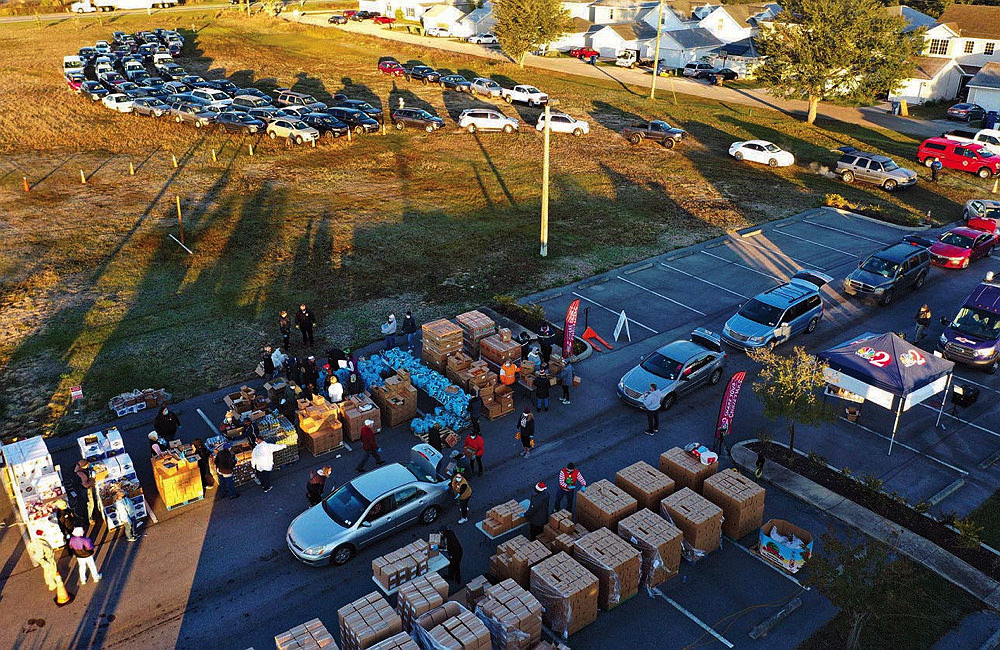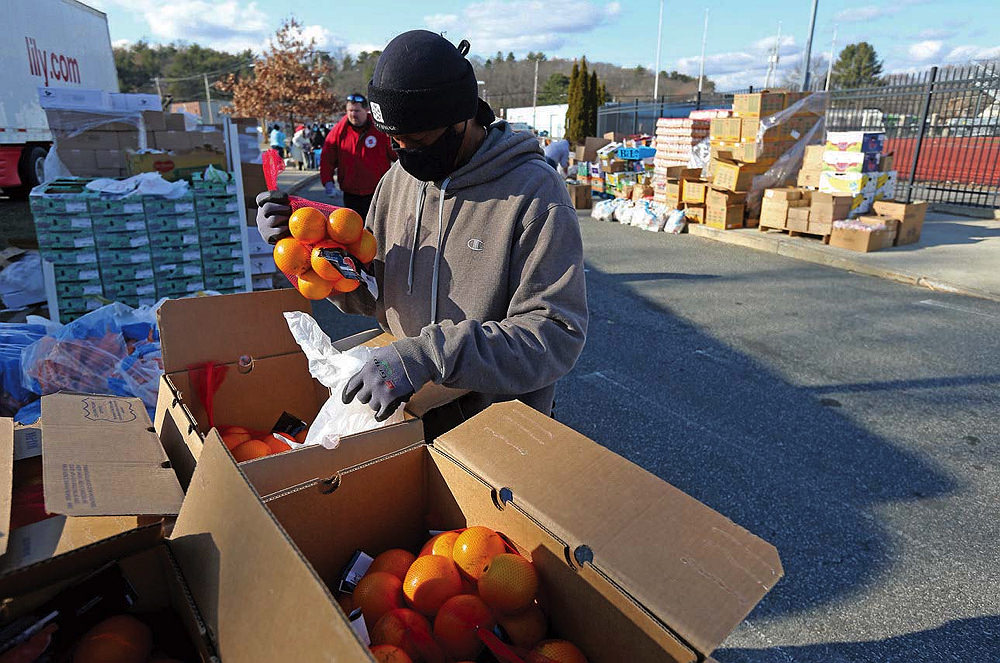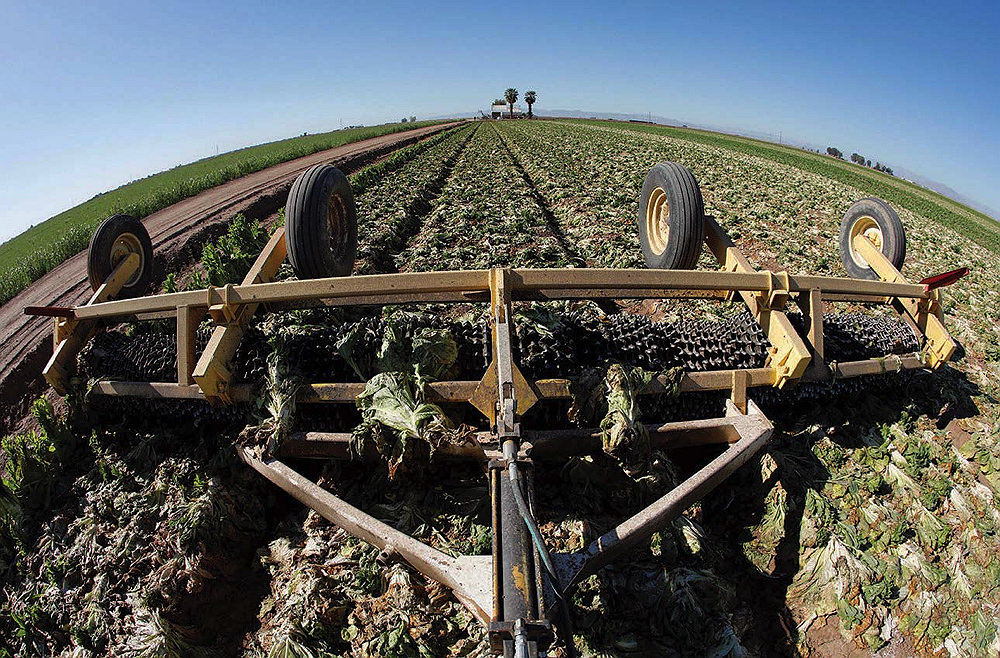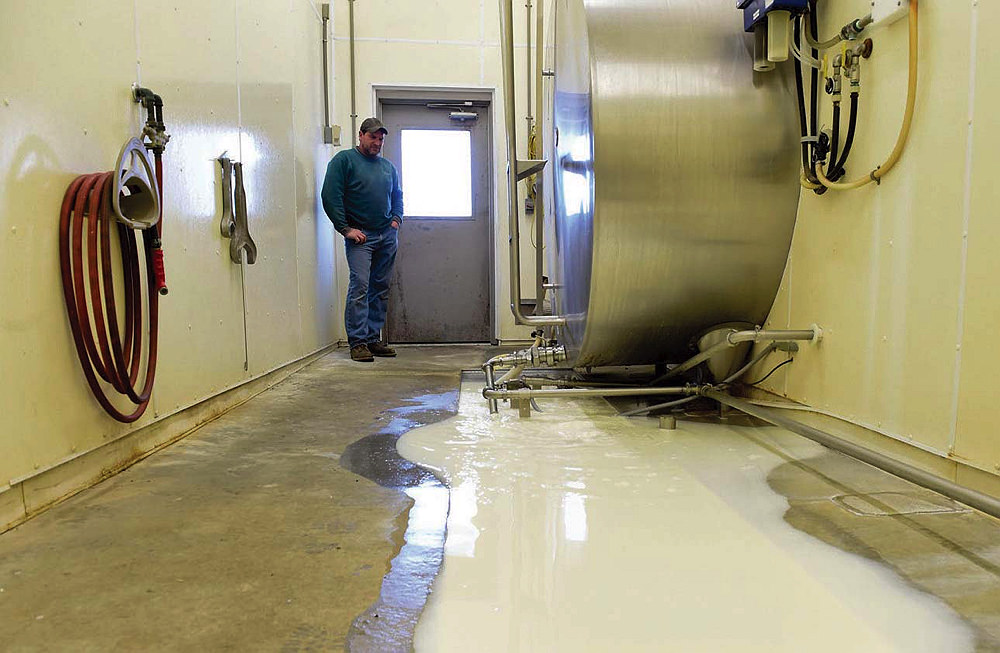Originally written by Jacob Sweet and published by Harvard Magazine
FOR ONE OF THE WORLD’S leading experts on food waste, visiting a grocery store can be frustrating. Stepping into her local Whole Foods, clinical professor of law Emily Broad Leib notices something awry in the store’s first produce display. The unbagged heads of broccoli lack date labels, but the bagged broccoli bears a “best by” date of August 12. “But that’s sort of picked out of thin air,” she points out. “There’s nothing going on with broccoli with no other ingredients. It doesn’t make any sense.” She reaches for a bag of grapefruits across the aisle—they don’t have a “best by” date. “That makes it even crazier,” she says. “Why would you put it on broccoli that’s no different than these things?”
It’s a simple example, but for Broad Leib, founder and director of Harvard Law School’s Food Law and Policy Clinic (FLPC), this inconsistent labeling is just one of many ways the United States spurns simple rules that can greatly reduce food waste. It’s finding and fixing these inefficiencies that has driven her and her team not just to research and recommend new ways to promote effective food policies, but also to create the rapidly emerging field of law. During a global pandemic that has left many unemployed and without food, the conversation has only become more urgent. It’s Broad Leib’s goal to fix the food system, one policy at a time.
Illogical Labels, Unnecessary Waste
U.S. FOOD LABELS ARE CONFUSING, as Broad Leib observed. Except for infant formula, federal laws do not regulate date labels, which vary widely in their helpfulness. “While manufacturers are prohibited from placing false or misleading information on a label,” the Food and Drug Administration’s (FDA) website points out, “they are not required to obtain agency approval of the voluntary quality-based date labels they use or specify how they arrived at the date they’ve applied.” The hands-off approach has led to a jumble of labeling practices. There are the classic “use by,” “sell by,” and “best by” labels, or more playful ones like “enjoy by” or “born on.” But the apparent precision of date labels masks the fact that many don’t signify much. What importance does the “sell by” label have once a product has left the store? Can one eat carrots a couple of weeks after their “best by” date, or is it better to throw them out?
For companies, which generally determine the wording and dates on food labels, this might not matter so much. From a food waste perspective, it does. A survey by the Food Marketing Institute found that 91 percent of consumers at least occasionally discarded food past its “sell by” date out of concern for the product’s safety. A quarter of respondents said they always did so. Grocery stores often throw out safe, healthy food because they worry donating it will lead to a lawsuit. Some food banks are not allowed to accept food past its labeled date—regardless of its meaning or accuracy.
Such waste is especially damaging in the face of food insecurity, or lack of access to safe, nutritious foods. Counting “off-date” disposals, restaurant and food-service waste, and other sources, an estimated 40 percent of all food is thrown away, even as 10.5 percent of U.S. households were deemed food insecure in 2019. In April 2020, at the depth of the pandemic-related economic closures and job losses, researchers found that proportion had more than doubled, with estimates ranging from 22 to 38 percent of the population. Households categorized as “very low food security” or where “normal eating patterns were disrupted to lack of resources” increased from 4 percent to 11 percent.
The apparent precision of date labels masks the fact that many don’t signify much.
Even as food banks saw demand soar, farmers were forced to discard more food than ever. As restaurants and schools closed, supply chains that got them milk, cheese, and butter seized up, so dairy farmers dumped an estimated 3.7 million gallons of milk daily. Produce rotted in fields or was plowed under for lack of markets. But the problem, Broad Leib notes, was not merely logistical. As people stopped going out, re-directing food from restaurants to grocery stores meant not only changing its destination but also adding labels and adjusting packaging to meet FDA requirements. Restaurants that wanted to donate or sell excess food had to add nutritional labels to food they’d normally serve without. “At the same time USDA [U.S. Department of Agriculture] was scrambling to get enough food to food banks and into the hands of needy families,” she wrote in “The Urgent Call for a National Food Strategy 2020,” “consumable food went to waste for no better reason than a slow response from officials at FDA.”
Redistributing unused food has never been easy or cost-free. But the pandemic exacerbated these problems, putting the unnecessary food waste on full display.
Finding Best Food Practices
FIFTEEN AGENCIES administer U.S. food laws and regulations, according to Broad Leib, among them the USDA, the Environmental Protection Agency (EPA), the Department of the Interior (DOI), and the FDA and Centers for Disease Control (CDC)—both under the auspices of the Department of Health and Human Services (HHS). Though the USDA and FDA control most food laws, their duties contradict and overlap: the FDA regulates the safety of eggs in the shell, for example, while the USDA regulates the safety of eggs out of the shell. The federal agencies, in turn, collaborate with state, local, and tribal governments which sometimes implement their own, stricter regulations. States regulate restaurants and food stores but enforce federal laws while carrying out food-facility inspections.
This mix of laws makes it difficult and costly for farmers, grocers, restaurants, and food banks to follow regulations. Broad Leib’s insight was to realize that regulatory complexity also obscures effective laws hiding in plain sight. Certain cities and states, she discovered, have found solutions to problems that might readily be applied elsewhere. Her clinic, which operates with the help of mostly law students enrolled in the clinic’s fall and spring courses, researches and advocates for improvements in all areas of food policy—conducting interviews, working to draft memoranda and regulatory comments, composing legislation, and collaborating with communities on getting food laws improved in the United States and abroad. Among many other projects, the group is working on improving dietary education for medical professionals, expanding the benefits of the Supplemental Nutrition Assistance Program (formerly known as food stamps), and developing strategies with community organizations across the country to reduce sugar consumption. But the clinic’s marquee issue—and Broad Leib’s longest-term priority—is food waste.
The U.S. Food Waste Policy Finder, launched in 2017, is one FLPC attempt to get the best food waste policies and practices in place across the country. For the first time, the project, a collaboration with food-waste nonprofit ReFED, provided easy ways to compare the relevant food laws in each state. With the tools on the website, farmers, food-bank operators, and politicians could determine which tax incentives, food-recycling laws, labeling regulations, and other legislation promoted or hindered food waste. For best-practice food-recovery policies, the map highlights Virginia’s Food Crop Donation Tax Credit, which lets farmers donate crops to nonprofit food banks and receive a tax credit equal to 30 percent of the fair market value. It recommends a Georgia recycling policy that permits non-animal food waste to be fed to animals without requiring the food to be heated first—a costly and largely unnecessary barrier to repurposing such waste. The map points to New York City as an example of a city government that removed unnecessary date labels; the city had once required labels on pasteurized milk, but realized that labeling such a low-risk product created unnecessary waste.
Many of the best policies displayed on the website, and discussed in scores of policy briefs by Broad Leib and her colleagues, have found their way into the country’s most meaningful food legislation. A year after the FLPC released its report on “Opportunities to Reduce Food Waste in the 2018 Farm Bill,” Congress passed legislation that included the first food-waste amelioration strategies in the nearly 90-year history of such bills. Among the programs were expanded liability protections for food donors, funding for expanded composting, and the establishment of a USDA food waste liaison—charged with coordinating federal programs to reduce unnecessary food waste.
Learning from Mississippi
EMILY BROAD LEIB was born in the suburbs of Philadelphia, the daughter of a doctor and a lawyer. From the very beginning, she felt drawn to her mother’s varied career as an attorney, in law firms, academia, and corporate practice. Nonetheless, she thought her future was in politics. As a teenager, she volunteered for her local congressman, Joe Hoeffel, showing up at events, being friendly, and explaining clearly and quickly the virtues of his policy positions. “And that’s something that I’ve taken with me into my work today,” she says. “A lot of my work is knowing the deep ins and outs of an area of law, but really making it salient and comprehensible to everyday people who don’t have the time or want to really know that level of detail.”
When she enrolled at Columbia in 1999, she planned to major in political science, but found she preferred more concrete history courses to theoretical political-science classes. After graduating in 2003, she worked in Japan for a year, and then spent a year in Philadelphia running a non-profit Jewish social-justice organization. Again, Broad Leib found herself articulating positions and trying to shape public policy, this time opposing the death penalty. The organization didn’t have enough money for an experienced executive director, so managerial duties largely fell to her. By the time Broad Leib entered the Law School in 2005, she had the sense that she could figure out how to organize people and push an organization toward a certain goal. “They’re not necessarily things you would learn in law school,” she said. “But I went in already having those skills and knowledge.”
At Harvard, she jumped into international human-rights work. As part of the short-lived War Crimes Clinic, she worked for tribunals at The Hague and spent the summer after 1L year in Cambodia, promoting education about the Khmer Rouge regime. She planned to return to Cambodia after graduation to train Cambodian lawyers, but her then boyfriend—now husband—was dealing with serious health issues. Though her international plans were sidetracked, an opportunity arose much closer to home. A funder and a group of universities wanted to bring someone to rural, northwest Mississippi to help the community address poor health and education and pervasive poverty. Given the core goals—“How can we make people’s lives better? What are some things in law or policy that can have an impact on that every day?”—Broad Leib recognized an opportunity to spot issues and help solve them.
Food assistance kicked into high gear during the pandemic in 2020. Volunteers load boxes of food into cars in Groveland, Florida
Photograph by Paul Hennessy/NurPhoto via Getty Images
She found that the law often got in the way of good ideas. In an area where only 25 percent of the population had access to a vehicle, people were hesitant to use off-duty school buses to provide transportation for fear that it would create “liability.” In brainstorming sessions, Broad Leib often found herself explaining that the liabilities people feared weren’t always such a problem. And if the potential for liability did exist, there were ways to adjust.

Volunteers pack produce for a Salvation Army food pantry in Lynn, Massachusetts.Photograph by Stuart Cahill/MediaNews Group/Boston Herald
This concept applied especially to food. When local graduate students working under Broad Leib went to farmers’ markets to survey farmers, they expected to hear requests for training, networking, and funding. Instead, they got questions about the law: What products could be sold? How would they be taxed? She hired eight Harvard law students to compile every law-related question farmers had, investigate the answers, publish a guide to legal conduct, and train them in safe, effective practice.
The experience was eye-opening, as the students found out “just how many legal questions there are that are really difficult to get answered,” Broad Leib says. They would seek an answer from the state government, but there was no hotline for food-based questions. Farmers participating in markets technically could pay a law firm for advice, but they couldn’t afford to do so. And the laws were often devised for large food processors, but were impractical for Mississippi farmers operating at small scale. She remembers a peach farmer whose crop ripened within a two-week period. Though he struggled to sell all his fresh fruit before it rotted, turning the peaches into longer-lasting products like pie and jam from home and selling them was illegal. Broad Leib and her team found that as of 2009, about 30 states allowed farmers to make and sell these kinds of low-risk products, after they took a safety class. After gathering anecdotes from farmers, bringing forward health and economic statistics, and analyzing similar laws nationwide, they urged the Mississippi legislature to adopt such policies; it did so two years later. The policy allowed farmers who had once chosen to sell products tax-free at their farms to come to bustling areas and receive the same tax incentives.
In brainstorming sessions, Broad Leib often found herself explaining that the liabilities people feared weren’t always such a problem.
Similarly, Broad Leib’s team probed the state’s inconsistent, and money-losing, practices governing sales taxation at farmers’ markets—a further disincentive to keeping money in local communities and increasing access to healthy food. The legislature passed the resulting bill exempting farmers markets from sales tax unanimously. “As soon as we passed the laws in Mississippi,” she recalled, “I started getting calls from people in Arkansas, and Alabama, and Tennessee, saying, ‘We heard that you got this law passed, can you help us change ours?’” She and colleagues turned their findings on allowing farmers to make and sell longer-lasting products into a national report, and then helped write laws in California, North Carolina, and Connecticut. Now, all states allow the practice. As supply chains faltered during the pandemic, Broad Leib noticed a huge uptick in the amount of home production—preventing even further waste.

As the pandemic began, supply chains faltered.Photograph by REUTERS/Mike Blake
By the time Broad Leib’s two-year fellowship ended, she had enlisted the help of 60 Harvard Law students in Mississippi and begun developing a course on U.S. food law and policy. She returned to the school in 2010, hoping it would back her in starting a program on community development, but the more she worked with food policy, the more the subject demanded her total focus. When the school approved the Harvard Food Law and Policy Clinic for the 2011 academic year, it became the country’s first food-law clinic. She later started the first food-law academic society, helping to legitimize food law and policy as an academic discipline distinct from agricultural law and food and drug law. Between 2014 and 2018, the number of food-law clinics at the top-100 law schools rose from one to four, and the number of clinics engaging with food issues tripled, to 69. Food law is growing, and Broad Leib is at the forefront.
Worldwide Reform
EVEN BEFORE COVID-19, about 820 million people around the world were living in hunger, according to the United Nations. Two billion more experienced moderate or severe food insecurity. At the same time, food production uses half the world’s habitable land and accounts for more than one-quarter of global greenhouse-gas emissions. “But globally, we’re wasting a third of all food produced,” Emily Broad Leib says. “It really doesn’t make any sense.”

Across the United States and the world, farmers plowed under crops, dumped milk, and slaughtered livestock.Photograph by Bill Uhrich/MediaNews Group/Reading Eagle via Getty Images
To reduce these ecological harms, some difficult problems need to be addressed. “We definitely need to tackle hunger, we need better jobs, we need to get people out of poverty,” she says, “We probably need to produce less of certain foods like meat products (see harvardmag.com/eating-environment-17).” But compared to these challenges, food waste—and making sure that food that’s produced actually gets consumed—is a relatively simple one. “Nobody is harmed by it,” she says. “Everyone benefits.”
In the Food Law and Policy Clinic’s (FPLC) 2013 report, “The Dating Game,” on confusing, contradictory, and wasteful U.S. date-labeling policies, Broad Leib and her colleagues focused on intuitive recommendations: make “sell-by” dates (designed for stock control) invisible to customers, establish clear language for quality- and safety-based labels so people don’t throw out food that’s still good, remove quality-based dates from non-perishable products. In 2016, Walmart announced that it would standardize its date labels in an effort to stop customers from throwing out fresh food. According to Frank Yiannis, the former vice president of food safety for the country’s largest food retailer, Broad Leib’s report convinced the company to act. Before, Walmart suppliers had used 47 different labeling standards on their products. Now, nearly all non-perishable products it carries have a “best if used by” label. The increased attention to waste has had an effect; Walmart threw out 57 million fewer food units in 2019 than it did the previous year, largely due to improvements in distributing nearly expired food.
“As soon as we passed the laws in Mississippi, I started getting calls from people in Arkansas, and Alabama, and Tennessee.”
The FLPC’s reforms are applicable more broadly, too. When Global FoodBanking Network (GFBN) vice president Doug O’Brien saw the U.S. Food Waste Policy Finder, the international nonprofit asked for the same thing, but for the entire world. Since 2019, Broad Leib and colleagues have done for 15 countries what they did for each U.S. state, analyzing their current laws and recommending which policies can be changed to limit waste. For this Food Policy Atlas project, the FLPC partners with a food bank and works with other food-donation organizations, businesses, and government agencies to understand the local legal context. “They literally know every little detail, so no one can really challenge them,” said Srishti Jain, who leads Feeding India, a non-profit that distributes food in underserved Indian communities. She recalls a meeting where Broad Leib drew upon practices in Pakistan for which there was no Indian precedent. “A person like me, who has been in the system for so long—and I know a lot about it—I had not come across that,” Jain says.
The more widely the FLPC researchers roam, the more model policies they find. The United States provides liability protection for food donation and offsets some costs associated with donating (policies that the FLPC recommends to other countries), but has no national guidance on date labeling. The United Kingdom allow just two options: “use by” (for foods that present a safety risk if not used quickly, like deli meats), and “best by” (for others). When the latter expires, U.K. law still permits it to be donated or sold. It’s a simple fix, but a meaningful one that the United States, and other countries, could adopt.
Not that these changes are easy to make. “There’s lots of good policies, there are brilliant ideas out there,” says O’Brien, “but if you can’t align the politics, they sit on a shelf.” But interest is rising, in face of persistent hunger and worsening climate crises. In September 2015, the United States declared its intention to halve food waste by 2030. This year, the United Nations announced halving food waste as a world goal. And, fortunately, many effective policies exist too. For Broad Leib, it’s a matter of getting out the message and making change happen, consulting with leaders from Costa Rica to India.
“My hope is that we can give countries starting points,” she said, “and help it happen faster.”


Health Law & Policy, Commentary
Gearing Up for 2025: Advocates Share Challenges and Opportunities – Health Care in Motion
December 18, 2024